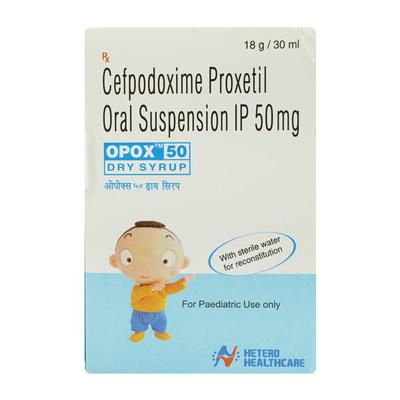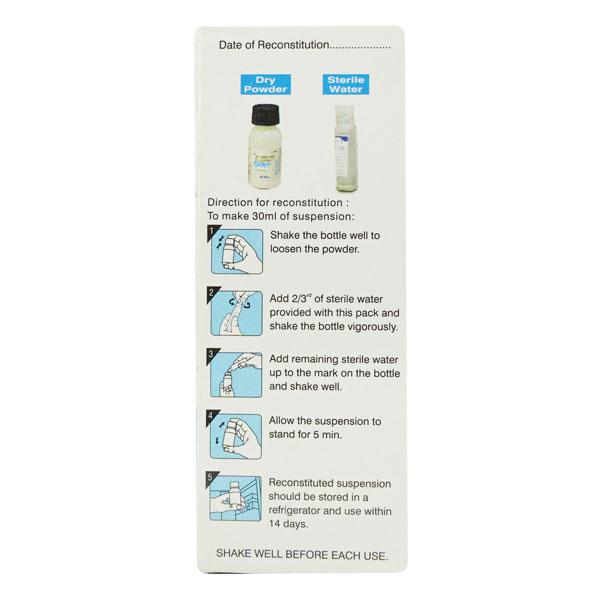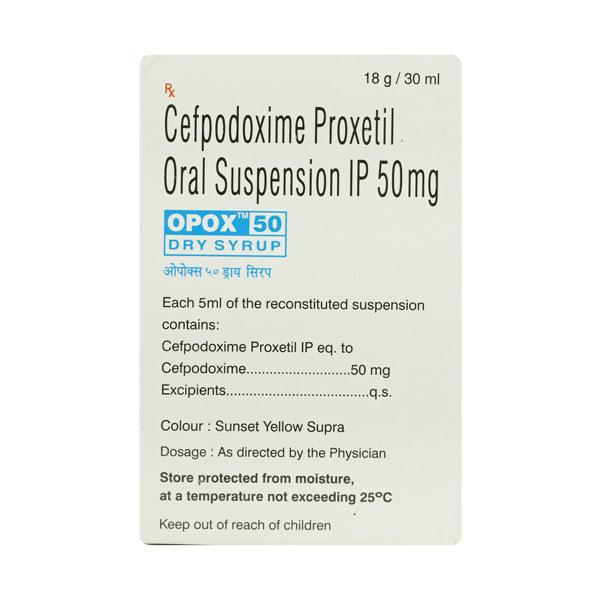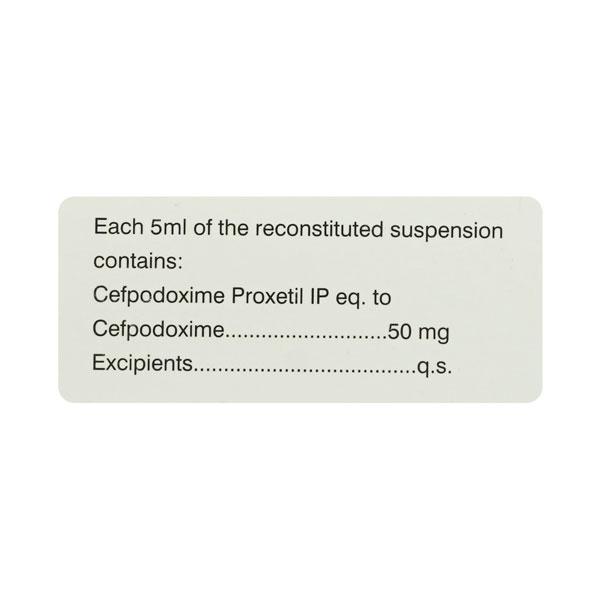

Netmeds First Membership
Quick Links
Introduction About OPOX 50MG DRY SYRUP
OPOX 50MG DRY SYRUP is used to manage a variety of bacterial infections in children, such as acute otitis media (inflammation of the middle ear leading to pain and fever), pharyngitis or tonsillitis (sore throat, difficulty swallowing, and tender lymph nodes), and sinusitis (inflammation around the nasal cavity leading to headache and runny nose).
It is also used to manage bronchitis (inflammation of tubes that carry air, leading to difficulty breathing), infection of the urinary tract (cystitis), pneumonia (an infection that inflames the air sacs in one or both lungs), and gonococcal infection (a sexually transmitted disease by indirect contact with an infected parent).
It contains a medicine called Cefpodoxime, which belongs to the group of medicines called Antibiotics. It works by stopping the growth of the bacteria that causes the infections.
Before giving OPOX 50MG DRY SYRUP to your child, inform your child’s doctor if your child has or has ever had colitis, liver problems, or impaired kidney function. Your child’s doctor may monitor the blood count and liver enzymes in blood tests during management with this medicine.
OPOX 50MG DRY SYRUP is not recommended for use in pregnant or breast-feeding women and elderly individuals, as it is used only in children. It is not recommended for use in infants less than 2 months of age.
The most common side effects of taking OPOX 50MG DRY SYRUP are diarrhea, nausea, abdominal pain, and headache. Consult your child’s doctor if any of the side effects worsen.
Uses Of OPOX 50MG DRY SYRUP
Manages bacterial infections in children such as:
How OPOX 50MG DRY SYRUP Works
OPOX 50MG DRY SYRUP manages infection by stopping or managing the bacteria from multiplying by inhibiting their cell wall formation, which is essential for the bacteria to survive as it provides protection from the environment. This kind of action that kills bacteria is useful in managing various bacterial infections.
How to use OPOX 50MG DRY SYRUP
- Give this medicine to your child as advised by the physician.
- Tap the bottle to loosen the powder.
- Add two-thirds of the sterile water (provided with the pack) and shake the bottle vigorously.
- Add more water up to the mark on the bottle and shake well before using.
- Allow the suspension to stand for 5 minutes.
- Use a medicine dropper to properly measure the dose.
- Your child’s doctor will decide the correct dose and duration of OPOX 50MG DRY SYRUP for your child depending upon the age, body weight, and type or severity of the infection.
Side Effects Of OPOX 50MG DRY SYRUP
Common Side Effects of OPOX 50MG DRY SYRUP:
- Diarrhoea
- Nausea, vomiting
- Headache
- Stomach pain
- Skin rash, including diaper rashes and fungal skin rashes
Stop giving OPOX 50MG DRY SYRUP to your child and contact the doctor immediately if your child experiences any of the following side effects:
- Severe diarrhea due to pseudomembranous colitis
- Signs of an allergic reaction (skin rash, joint pain, swallowing or breathing problems, swelling of your lips, face, throat, or tongue)
Warning & Precautions
Pregnancy
ContraindicatedOPOX 50MG DRY SYRUP is not recommended for use in pregnant women as it is used only in children.
Breastfeeding
ContraindicatedOPOX 50MG DRY SYRUP is not recommended for use in breast-feeding women as it is used only in children.
Driving and Using Machines
ContraindicatedDo not let your child ride bicycles, drive other vehicles, or operate any tools if they feel dizzy after taking OPOX 50MG DRY SYRUP.
Kidney
Use with CautionOPOX 50MG DRY SYRUP should be taken with caution in children with impaired kidney function.
Liver
Use with CautionOPOX 50MG DRY SYRUP should be taken with caution in children with liver problems.
Allergy
ContraindicatedDo not give OPOX 50MG DRY SYRUP to your child if they are allergic to cefpodoxime or to the cephalosporin group of antibiotics (such as cefuroxime, cefixime) or if they have experienced immediate or severe allergic reactions to penicillin or other beta-lactam antibiotics such as aztreonam.
Lungs
ContraindicatedOPOX 50MG DRY SYRUP is not recommended for use in children with pneumonia or atypical pneumonia caused by certain organisms.
Use In Pediatrics
ContraindicatedOPOX 50MG DRY SYRUP is not recommended for use in infants (less than 2 months of age) due to lack of safety and effectiveness. Therefore, consult your child’s doctor for advice.
Use In Geriatrics
ContraindicatedOPOX 50MG DRY SYRUP is not recommended for use in elderly patients as it is used only in children.
Others
Before giving OPOX 50MG DRY SYRUP to your child, inform the child's doctor if your child:
- Have a history of gastrointestinal disease (particularly colitis)
Interactions
A. Drug-drug interactions:
Before giving OPOX 50MG DRY SYRUP to your child, inform the child’s doctor if your child is taking or receiving any of the following medicines:
- Medicines used to manage stomach acid symptoms such as indigestion or stomach ulcers (Ex. aluminium hydroxide, sodium bicarbonate, magnesium hydroxide, simethicone)
- Propantheline (used to manage gastric ulcers)
- Medicines for managing gastric ulcers (Ex. ranitidine, cimetidine)
- Medicines used to manage high blood pressure or fluid retention (Ex. spironolactone, bumetanide, torsemide)
- Other medicines used to manage bacterial infections (Ex. gentamicin, streptomycin)
- Probenecid (used to manage gouty arthritis)
- Warfarin (used to manage blood clots)
Overdosage:
If your child or anyone else accidentally takes too much of OPOX 50MG DRY SYRUP, consult your child’s doctor immediately or visit the nearby hospital. Overdosage symptoms of OPOX 50MG DRY SYRUP are nausea, diarrhea, vomiting, epigastric distress, and encephalopathy may occur in patients with renal insufficiency.
Synopsis
| Drug | : | Cefpodoxime |
| Pharmacological Category | : | Cephalosporins |
| Therapeutic Indication | : | Bacterial infections |
| Dosage Forms | : | Tablet, Capsule, Oral Suspension, Syrup, Oral Drops, Dry Syrup, Dry Suspension, Dispersible Tablet |
More Information
FAQs About OPOX 50MG DRY SYRUP
Q: What is OPOX 50MG DRY SYRUP used for?
A: OPOX 50MG DRY SYRUP is used to manage a variety of bacterial infections in children, such as acute otitis media, pharyngitis or tonsillitis, sinusitis, bronchitis, infection of the urinary tract, pneumonia, and gonococcal infection.
Q: Is OPOX 50MG DRY SYRUP a very strong antibiotic?
A: OPOX 50MG DRY SYRUP works against a large spectrum of bacteria to manage tonsillitis, pneumonia, bronchitis, infection of the ear, skin, urinary tract, throat, etc. It belongs to the cephalosporin antibiotics, and it is very effective.
Q: When does OPOX 50MG DRY SYRUP start showing its effect?
A: OPOX 50MG DRY SYRUP usually starts working in one to two hours. You should wait for improvement in symptoms, as there are no external improvements seen with it. OPOX 50MG DRY SYRUP should be given to your child regularly for every 12 hours for 5-14 days as advised by your child’s doctor, even if your child starts feeling better in the first 2 days.
Q: Can OPOX 50MG DRY SYRUP be given with milk?
A: Always administer the medicine to your child as advised by your child’s physician. OPOX 50MG DRY SYRUP should not be taken with any dairy products, juice, or calcium-based food products. In case of any discomfort in your child during management with OPOX 50MG DRY SYRUP, consult your child’s doctor immediately.
Q: What are the common side effects of OPOX 50MG DRY SYRUP?
A: The common side effects associated with the use of OPOX 50MG DRY SYRUP are abdominal pain, diarrhea, nausea, vomiting, and headache. If your child gets any of the side effects, consult your child’s doctor immediately.
Q: Is the use of OPOX 50MG DRY SYRUP safe for kidneys?
A: OPOX 50MG DRY SYRUP should be used with caution in children with impaired kidney function. Your child’s doctor may adjust the dose depending upon kidney function and patients undergoing hemodialysis. Consult your child’s doctor for advice before administration of OPOX 50MG DRY SYRUP.
Q: How does OPOX 50MG DRY SYRUP work?
A: OPOX 50MG DRY SYRUP manages infection by stopping or managing the bacteria from multiplying by inhibiting their cell wall formation, which is essential for the bacteria to survive as it provides protection from the environment. This kind of action that kills bacteria is useful in managing various bacterial infections.
Q: How to use OPOX 50MG DRY SYRUP?
A: Give OPOX 50MG DRY SYRUP to your child as advised by the physician. Tap the bottle to loosen the powder. Add two-thirds of the sterile water (provided with the pack) and shake the bottle vigorously. Add more water up to the mark on the bottle and shake well before using. Allow the suspension to stand for 5 minutes. Use a medicine dropper to properly measure the dose. Your child’s doctor will decide the correct dose and duration of OPOX 50MG DRY SYRUP for your child depending upon the age, body weight, and type or severity of the infection.
Q: What precautions must be taken while using OPOX 50MG DRY SYRUP?
A: OPOX 50MG DRY SYRUP should be taken with caution in children with impaired kidney function, liver problems, or a history of gastrointestinal disease (particularly colitis). Consult your child’s doctor for advice before administration of OPOX 50MG DRY SYRUP.
Q: Who should not take OPOX 50MG DRY SYRUP?
A: OPOX 50MG DRY SYRUP is not recommended for use in children with pneumonia or atypical pneumonia, or if your child is allergic to cefpodoxime or to the cephalosporin group of antibiotics (such as cefuroxime, cefixime), or if they have experienced immediate or severe allergic reactions to penicillin or other beta-lactam antibiotics such as aztreonam. Consult your child’s doctor for advice before administration of OPOX 50MG DRY SYRUP.
Q: Is OPOX 50MG DRY SYRUP safe for kids?
A: OPOX 50MG DRY SYRUP is not recommended for use in infants (less than 2 months of age) due to lack of safety and effectiveness. Therefore, consult your child’s doctor for advice.
References
1. KD. Tripathi. Antimicrobial Drugs. Essentials of Medical Pharmacology. Seventh Edition. 2013. Page – 688.
2. Briggs GG, Freeman RK, editors. A Reference Guide to Fetal and Neonatal Risk: Drugs in Pregnancy and Lactation. 10th ed. Philadelphia, PA: Wolters Kluwer Health; 2015. Page – 670 & 671.
3. H Hirosawa, Y Ishikawa, S Takahashi, H Matsuda, H Ichihashi. [Study of efficacy, safety, and dosage on cefpodoxime proxetil in pediatric infections]. NIH National Library of Medicine, National Center for Biotechnology Information. Pubmed.gov. July 1989. [Accessed on 5th October 2024] click here
4. R. Fujii. Clinical trials of cefpodoxime proxetil suspension in Paediatrics. NIH National Library of Medicine, National Center for Biotechnology Information. Pubmed.gov. 1991. [Accessed on 5th October 2024] click here
5. Cipla Ltd. (Cefoprox 50 Oral suspension) (Cefpodoxime). [Revised in October 2018] [Accessed on 5th October 2024] click here
6. Intralife Private Ltd. Cefpodoxime 25 mg. [Accessed on 5th October 2024] click here
User Feedback












